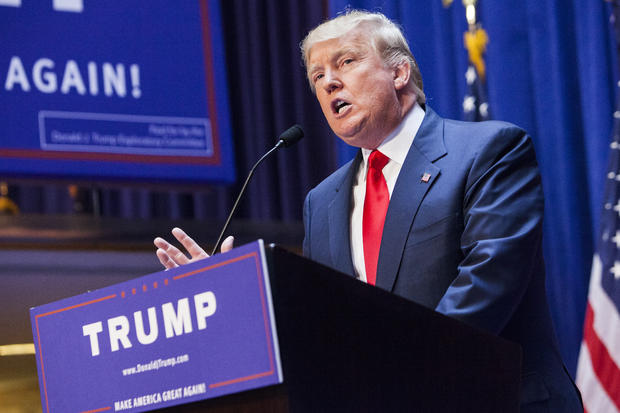Trump cries foul on unofficial campaign gear sellers
For at least three presidential election cycles, savvy Internet marketers have cashed in on the public's hunger for campaign paraphernalia emblazoned with their favorite candidate's name, likeness and slogan. These sales channels operate independently of the actual campaigns, meaning the candidates' coffers don't see any money from these sales.
But this year, Donald Trump's organization is sending cease-and-desist letters to such online marketing outfits, warning them that use of Trump's name, likeness and trademarked slogan -- "Make America Great Again" -- are illegal infringements on Trump's trademark rights.
The Trump slogan is most often associated with President Ronald Reagan's "Let's Make America Great Again."
In a copy of one of the cease-and-desist letters obtained by CBS MoneyWatch, Alan Garten, general counsel for the Trump Organization, accused CafePress, a California-based Internet marketing firm, of cyberpiracy and trademark infringement. Garten took CafePress to task for using www.makeamericagreatagain.com as a way to direct Web traffic to its site, where dozens of Trump-related items are for sale, ranging from iPhone covers and Trump 2016 hats.
A quick bit of websurfing produced several other sources for unofficial Trump gear, including on Amazon (AMZN). A call to Amazon wasn't returned. Garten declined to identify other cease-and-desist targets, but he confirmed several got the letters.
A CafePress spokesperson said the company's legal department was reviewing the Trump letter. The CafePress media contact also forwarded a company webpage headlined the "Election Barometer," which uses sales data from its various lines of paraphernalia as a kind of election results prognosticating tool.
"Who needs fancy spreadsheets, statistics or voter polls when you have CafePress? CafePress has correctly predicted the last three presidential elections based on our sales data alone," the company's website declares. Based on CafePress' data, products with Trump's name sold 20,000 times, with his closest rivals, Ben Carson and Ted Cruz, far behind with around 5,000 items each.
"You have people believing they are supporting a campaign, and they are just buying counterfeit goods," Garten said. "People will say this is a free speech issue, but using Mr. Trump's trademark for your own personal profit is not protected by the First Amendment."
Under federal election law, purchases made on a candidate's website count as campaign contributions.
The Trump camp isn't the only one annoyed with the widespread piggybacking on their efforts by unrelated profit-making companies. "Those outside paraphernalia are not sanctioned by the campaign and none of the proceeds can be legally donated to the campaign," wrote Kenneth Pennington, digital director for Democrat Bernie Sanders' campaign.
Pennington said consumers who aren't buying from the official campaign website have no guarantee the items they're buying are union-made, something Sanders' campaign website guarantees.
The aggressive move by Trump to shut down the unofficial channels comes as no surprise to Alan Marcus, a public relations professional who worked with the Republican presidential hopeful for several years.
"Conventional politicians think they're in a business that just goes out of business the first Tuesday after the first Monday in November (Election Day)," said Marcus. "Trump sees his name as a brand that's his biggest asset. The Bushes will say politics is their 'family business,' but they don't see themselves as a brand."
